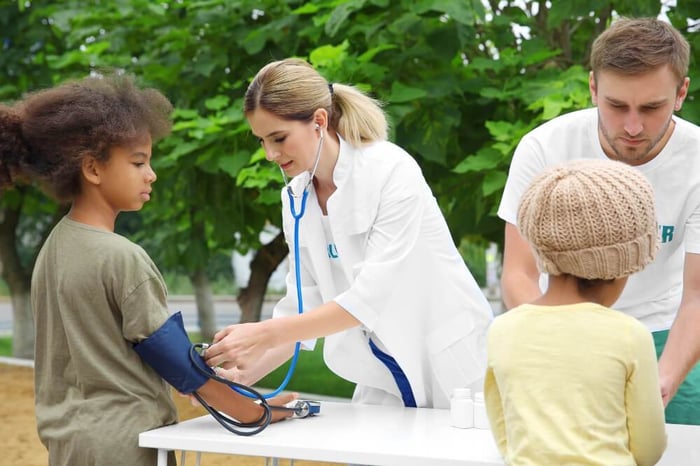
How Important is Volunteering for Medical School
There are multiple components to a successful medical school application, and while you can stand out in many unique ways, there are some core elements that are generally sought after by admissions committees. One of those is evidence of volunteer experience and we are going to discuss why and just how important it is to have for prospective medical students. We will discuss the importance of volunteering for medical school applications and your next step will be to secure your medical work experience.

Gaining invaluable experience and insight into a career in medicine
Knowing why you want to work in the medical field and being able to articulate that at your medicine interview is crucial for med schools when they decide which of their applicants they are going to make offers to. Nothing supports your argument for commitment to medicine better than having had hands-on work experience to show for it, and for a lot of young adults that often comes in the form of volunteer work.
Signing up to volunteer in your local hospital, nursing home or charity shop are good ways of gaining invaluable experience that you could talk about at your interviews. Being able to talk about what working in health care looks like and entails, as well as sharing your knowledge of the various roles and responsibilities of different healthcare professionals that you have worked alongside will present you as a competent candidate and will thus boost your competitiveness.

Showing dedication and commitment to your chosen path
By signing up to volunteer, you not only gain experience, but you also show your assessors that you are dedicated to your decision to pursue medicine, further stressing your maturity and commitment. A lot of students grow up wanting to be doctors, but having something to show for that desire in your application when the time comes, will surely make you stand out in the crowd. Choosing to spend your weekends or after school hours volunteering in a hospital or other healthcare setting shows that you have the right mindset for a future in medicine and strengthens your passion for the field more than the most eloquent words.
Of course, don’t just volunteer because it looks good on paper medical school admissions interviewers can spot from miles away whether your heart is in it or you just did it for the brownie points.
Lastly, volunteering helps your development as a person and a future medical student, so if you thoroughly enjoyed it, you can always turn it into a long-term commitment. Plenty of medical students carry on working part-time in the hospital or care home they started out at when applying to medical school, with a small time commitment on the weekend or even fortnightly.
BMA's Work Experience - Advice for Students and NHS's Gaining Experience for Medical Schools are some excellent resources to consult to further strengthen the notion of the importance of volunteering as an aspiring, and even current, medical student.

Developing empathy
Being empathetic is a key quality that aspiring pre-meds are expected to possess and there is no better way of showing that than volunteering experience. You could be incredibly smart, very well composed with decision-making under pressure and have a fantastic eye-hand coordination, but you wouldn’t go very far in your medical training if you were unable to communicate with your patients, empathise with their worries and be able to address their concerns and expectations from their visit.
Having already had exposure to and communicated with patients in a medical setting means that you have had a chance to practice empathy on multiple occasions, offering words of support or encouragement. It would be a good idea to discuss a particular example that stuck with you from your work experience at your interview. Maybe a little boy came in with a broken arm and you kept him company and entertained him while his parents spoke to the doctors? Or spent an afternoon with an old lady who was awaiting surgery, talking about her life? It could be the most simple event, but if it was genuine and you are able to show the impact you had on that individual with your empathy, no matter how small, you will surely tick off a few boxes that interviewers are looking for.
Improving your communication skills
It’s easy to list communication skills in your personal statement, but once you get invited to the interview, it will become clear quite quickly whether you truly possess them or not. One easy way to build on your communication skills, especially in a health care setting, is by volunteering. As a volunteer, you might be asked to do many different things, join a different team or healthcare professional each day and ultimately, speak to a wide variety of people, from doctors and nurses to patients and members of the public. This will hone your communication skills, it will help you find out how to talk to people and even give you an edge in medical school when you start running simulated patient scenarios. Therefore, this is an invaluable skill you can pick up volunteering that will come in handy not only during interviews, but it will also serve you well throughout your entire medical training and later on in your career too.
Overall, volunteering is an extremely valuable experience and even having done a little is better than none. Everybody has different workload and responsibilities, both at school and at home. Perhaps you are a competitive athlete or have to work on the weekends for a little bit of extra income, and thus not have as much free time that you can dedicate to volunteering as your classmate who is also applying. Medical schools don’t expect that everyone will have committed 200 hours of volunteering prior to applying and rather look for well-rounded applicants that are mindful in their choices and pursue extracurriculars that not only help strengthen their application but develop their qualities and skills, too. Therefore, don’t worry if you are only able to commit a few hours a month to volunteering or have only done that one-off two-week care home experience, and focus instead on extrapolating the lessons you learned from it and how they can make you a better doctor.
We hope that these tips were helpful and you have a bit more insight into the importance of volunteering when applying to medical school. If you have any questions, email us at [email protected].



